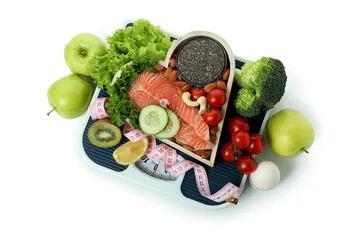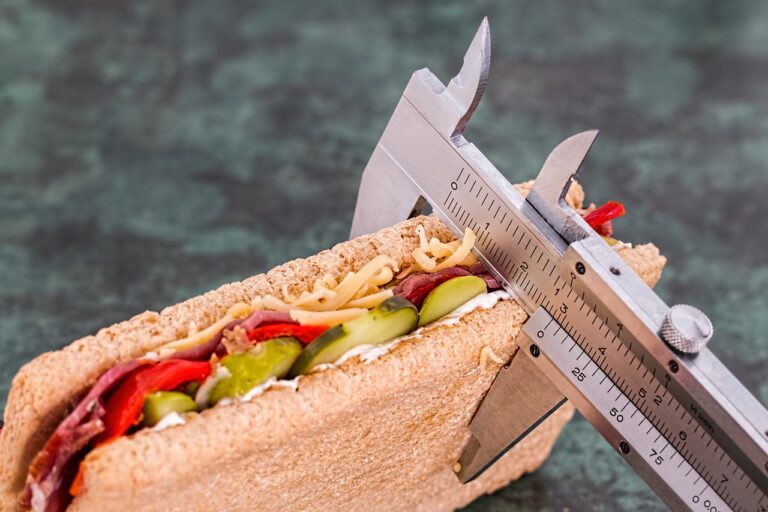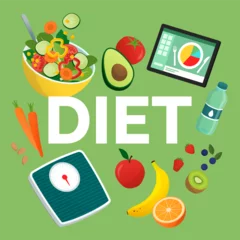Ramadan, the holy month of fasting, is not only a time for spiritual reflection but also an opportunity for many to embark on a journey towards better health and well-being. For those aiming to lose extra pounds, Ramadan presents a unique opportunity. With the right approach, you can achieve your weight loss goals while fasting.
In this comprehensive guide, we reveal the secrets of a Ramadan diet plan for weight loss, including tips for Sehri, healthy iftar options, and effective strategies to lose weight during Ramzan. With a well-crafted Ramadan diet plan for Sehri, you can achieve your goals while honoring the spirit of Ramzan and it becomes very easy to lose weight in Ramzan.
Here at Diet Fit, we’re dedicated to providing personalized guidance for healthy living throughout the year, and Ramadan is no exception. To create an effective diet plan for weight loss during Ramadan, it’s essential to strike a balance between nutritional intake, portion control, and timing of meals.
Diet Plan for Sehri:
The early morning meal, called Sehri, is really important for keeping your energy up all day. Managing a balanced Sehri can prevent overeating during iftar and help maintain stable blood sugar levels. Here’s a sample diet plan for a Sehri :
Hydration :
Not drinking enough water can make you eat too much later on.. A Ramadan diet plan for weight loss prioritizes hydration. During Sehri, focus on water-rich foods like fruits and vegetables (cucumber, watermelon) and drink plenty of water. This helps you feel fuller for longer and supports a healthy iftar and weight lose in Ramzan.
Limit Caffeine Intake:
While a cup of coffee or tea can provide a temporary energy boost, excessive caffeine consumption can lead to dehydration. Limit your intake during Sehri.
Complex Carbohydrates:
Try to eat slow-digesting carbs like whole-wheat bread, brown rice and oats . These provide sustained energy throughout the day, keeping you feeling fuller for longer. Complex carbohydrates are your long-lasting energy allies in your Ramadan diet plan for weight loss. For a diet plan of Sehri, focus on whole-wheat bread, brown rice, oats, or quinoa. These options provide sustained energy release, keeping you feeling full and preventing overeating at a healthy Iftar. Pair these complex carbs with lean protein for an even more satisfying Sehri meal, promoting weight loss in Ramzan.
Lean Protein:
Include protein sources like grilled chicken, fish, eggs, or lentils in your diet plan for Sehri. Protein helps build muscle mass, which aids metabolism and promotes satiety. This helps prevent overeating later in the day and supports your weight loss goals throughout Ramzan
Healthy Fats:
A healthy diet plan for Sehri must include healthy fats like avocado, nuts, or seeds. These fats keep you feeling satisfied and provide essential nutrients. These healthy fats also promote a healthy metabolism, aiding weight loss in Ramzan. So, include them in your diet plan for Sehri and a fulfilling and weight-loss-friendly start to your fast.
Simple diet plan for Sehri:
1. Power-Packed Oatmeal (1 Serving):
- ½ cup rolled oats
- 1 cup unsweetened almond milk (or low-fat milk)
- ½ cup berries (blueberries, raspberries, etc.)
- 1 tablespoon chia seeds
- Sprinkle of cinnamon (optional)
Benefits: This oatmeal bowl provides sustained energy from complex carbs, protein from almond milk, healthy fats from chia seeds, and antioxidants from berries. Cinnamon helps regulate blood sugar.
2.Scrambled Eggs with Whole-Wheat Toast (1 Serving):
- 2 eggs, scrambled
- 1 slice whole-wheat toast
- ½ cup chopped spinach or other leafy greens
- Salt and pepper to taste
Benefits:a diet plan for sehri that includes Eggs offer complete protein, while whole-wheat toast provides complex carbs. Spinach adds vitamins and minerals, keeping you feeling full.
3. Yogurt Parfait with Fruit and Nuts (1 Serving):
- ½ cup plain yogurt (2% fat)
- ½ cup chopped fruits (apple, banana, or mixed berries)
- ¼ cup chopped nuts (almonds, walnuts, or pecans)
- Drizzle of honey (optional)
Benefits: yogurt is a good source of protein and calcium, while fruits and nuts add sweetness, healthy fats, and fiber. Honey offers a touch of sweetness without being overly sugary.
Tips for Weight Loss Success:
- Prioritize a Balanced Sehri: The pre-meal before the fast sets the tone for your entire day. Focus on complex carbohydrates like whole-wheat bread, brown rice, or oats for sustained energy. Include lean protein sources like eggs, lentils, or grilled chicken to build muscle and promote satiety. Don’t skip healthy fats from avocado, nuts, or seeds as they keep you feeling full and provide essential nutrients. Remember to stay hydrated by drinking plenty of water during Sehri to avoid overeating later.
- Portion Control: Start with smaller portions and gradually increase if needed.
Iftar, the evening meal that breaks the fast, is a celebration, but mindful eating is key. Start with dates and water to gently break the fast, followed by light, clear soups for easy digestion. Prioritize healthy iftar by eating fruits and vegetables rich in vitamins, minerals, and fiber. Include a moderate portion of lean protein like grilled chicken or fish for sustained energy. Be mindful of your portion sizes and avoid overindulging in fried foods and sugary drinks. - Limit Sugary Drinks: Avoid sugary drinks like juices and sodas. And promotes healthy iftar options try to drink water instead of the other drinks Sugary drinks and processed foods offer minimal nutritional value and can hinder your weight loss efforts. Go for water, unsweetened tea, or black coffee throughout the day. Avoid sugary juices, sodas, pastries, and processed snacks.
- Minimize Processed Foods: Skip processed breakfast cereals, pastries, and sugary snacks. Try to go for the healthy iftar option like homemade patties and home made pasta
Breaking Your Fast the Right Way: The Healthy Iftar
Iftar, the evening meal that breaks the fast, is a time for celebration and togetherness. But with so many delicious options, it’s crucial to approach this meal with a focus on healthy Iftar choices. Here’s how:
- Dates and Water: Traditionally, dates and water are consumed to gently break the fast. Dates are a natural source of sugars and electrolytes, aiding rehydration and promotes a healthy iftar
- Light Soups: go for light, clear soups like vegetable or lentil soup to ease your digestive system back into action after a long break.
- Fruits and Vegetables: Prioritize fresh fruits and vegetables rich in vitamins, minerals, and fiber. These will nourish your body and keep you feeling full.
- Lean Protein: Include a moderate portion of lean protein like grilled chicken, fish, or lentils in your Iftar meal.
A Simple Iftar Meal Plan that Promotes Weight Loss:
- Dates and Water: Start with a couple of dates and a glass of water to gently break the fast.
- Lentil Soup: A bowl of warm lentil soup is a light and nutritious option, rich in protein and fiber.
- Grilled Chicken with Roasted Vegetables: Grilled chicken provides protein, while roasted vegetables add vitamins, minerals, and fiber.
- Fruit Salad: A refreshing fruit salad is a delightful way to end your healthy Iftar meal.
Tips for a Weight-Loss Friendly Iftar:
- Control how much you eat: Pay attention to how big your servings are.. Start with smaller portions and slowly increase if you’re still feeling hungry.
- Limit Fried Foods and Sugary Drinks: Avoid fried foods and sugary drinks like sodas and juices. These offer minimal nutritional value and can hinder your weight loss efforts. Option for water, unsweetened tea, or black coffee instead.
- Savor Your Food: Take your time eating and chew your food thoroughly. This allows your body to register satiety signals, preventing overeating.
- Stay Hydrated Throughout the Night: Continue to drink plenty of water throughout the non-fasting hours to stay hydrated and prevent overeating at subsequent meals.
Importance of Consulting a Dietitian:
- A registered dietitian can create a personalized Ramadan diet plan for weight loss that considers your health history, allergies, and weight loss goals.
- They can provide guidance on portion control, meal planning, and healthy food swaps to fit your cultural preferences.
- They can offer support and motivation throughout your weight loss in Ramadan.
Conclusion :
Ramadan is a beautiful time for spiritual growth and community. By incorporating these tips and following a well-crafted Ramadan diet plan for weight loss, you can achieve your weight loss goals while honoring the spirit of Ramzan. Prioritize a balanced diet plan for Sehri with complex carbs, lean protein, and healthy fats. Make mindful choices at healthy Iftar, focusing on fruits, vegetables, and lean protein. Remember, Ramadan is also about spiritual reflection. Embrace the balance between healthy eating habits, prayer, and enjoying this special time with loved ones. With a little planning and these strategies, you can have a fulfilling and weight-loss-friendly Ramadan. DietFit can be your trusted partner throughout this journey. Our team of registered dietitians will create a personalized plan, guide you on mindful eating practices, and provide ongoing support to ensure a fulfilling and weight-loss-successful Ramadan. Let DietFit empower you to reach your wellness goals while embracing the spiritual significance of this holy month. Contact us at:+92 336 1855749 OR follow us at dietfit.pk



